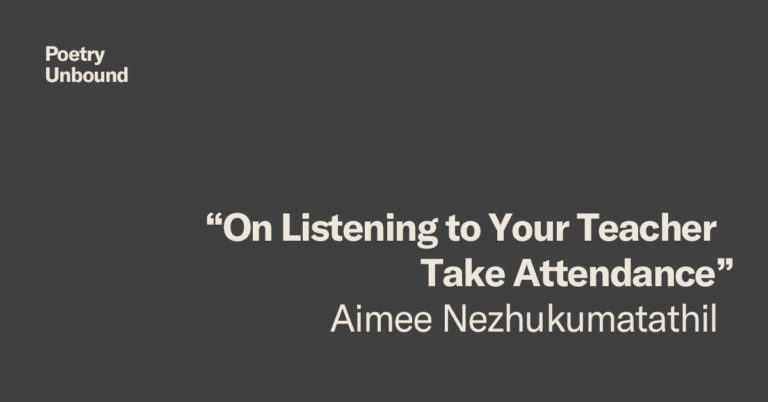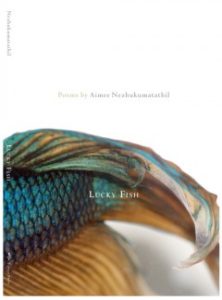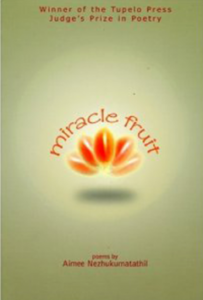Aimee Nezhukumatathil
On Listening to Your Teacher Take Attendance
Aimee Nezhukumatathil’s poem “On Listening to Your Teacher Take Attendance” offers a way to ground yourself during vulnerable moments. The poet gathers strength from being loved, which helps her in times of displacement.
A question to reflect on after you listen: What stories do you hold on to when you’re feeling displaced?

© All Rights Reserved.
Guest

Aimee Nezhukumatathil is the author of a book of nature essays, World of Wonders: In Praise of Fireflies, Whale Sharks, & Other Astonishments (Milkweed Editions, 2020), which was named a finalist for the Kirkus Prize in non-fiction, and four award-winning poetry collections, most recently, Oceanic (Copper Canyon Press, 2018). Awards for her writing include fellowships from the Mississippi Arts Council, Mississippi Institute of Arts and Letters Award for poetry, National Endowment of the Arts, and the Guggenheim Foundation. Her writing has appeared in NYTimes Magazine, ESPN, and Best American Poetry. She is professor of English and creative writing in the University of Mississippi’s MFA program.
Transcript
Pádraig Ó Tuama, host: My name is Pádraig Ó Tuama. I’m a poet from Ireland, and I think that poetry offers the world something that’s small enough to carry close to your heart and big enough to carry all the ordinary things that can be encompassed in any one day.
“On Listening to Your Teacher Take Attendance” by Aimee Nezhukumatathil:
“Breathe deep even if it means you wrinkle
your nose from the fake-lemon antiseptic
of the mopped floors and wiped-down
doorknobs. The freshly soaped necks
and armpits. Your teacher means well,
even if he butchers your name like
he has a bloody sausage casing stuck
between his teeth, handprints
on his white, sloppy apron. And when
everyone turns around to check out
your face, no need to flush red and warm.
Just picture all the eyes as if your classroom
is one big scallop with its dozens of icy blues
and you will remember that winter your family
took you to the China Sea and you sank
your face in it to gaze at baby clams and sea stars
the size of your outstretched hand. And when
all those necks start to crane, try not to forget
someone once lathered their bodies, once patted them
dry with a fluffy towel after a bath, set out their clothes
for the first day of school. Think of their pencil cases
from third grade, full of sharp pencils, a pink pearl eraser.
Think of their handheld pencil sharpener and its tiny blade.”
[music: “First Grief, First Air” by Gautam Srikishan]
I recognize that every time I’ve read this poem, I’m thinking back to an experience I had in school. I was in an all-boys school, and I must’ve been ten. And one of the fellows in the class said, “Pádraig’s got a weird laugh.” And then everybody laughed, and I laughed, because that’s what you do when people are laughing at you.
And the object of that kind of hostility in a classroom moves. One day it’s you; the other day it’s somebody else; then it comes back to you; it goes to somebody else. And the strange government that’s established between children and the offense people sometimes take at a new person or a person who has something that makes them stand out, whether that’s a privilege or a lack of privilege, something that’s in any way different, whether that’s a laugh, whether that’s the fact that you’re a new person in school. There’s always going to be the capacity for the classroom to turn on that one person. And there’s the need for inner resources to build something up. And so, when I read this poem, I think of being that child.
And in the Aimee Nezhukumatathil poem, you get this sense that she has come to this like a flexed muscle. She knows what to do, because she’s schooling herself — “OK, this is what you do. They’re all turning round.” There’s that attention to their necks, and they’re looking with their necks, and then their necks, craning. And she’s thinking, “Think about their necks.” In a certain sense, she’s a peer. But then she’s imagining them as infants. Somebody patted dry their neck. And so there are these small domestications that she’s doing. So she’s at once among them, but she’s also a little bit older.
And then she’s also recognizing the violence, the “tiny blade.” I think that those two final words are extraordinary, a “tiny blade.” On the one hand, a blade can cut. But she’s saying it’s tiny; don’t let this be a big thing.
Life is filled with finding oneself in unexpected rooms where you think, “Everybody here knows something that I don’t know yet. People here are more familiar here than I am.”
And as a result of that, the wisdom of this poem is saying, “Hold something beautiful in your mind. Hold something that reminds you of who you are.” And the generosity of this poem is that the reminder of who she is, is about the ocean, is about a family trip, is about something beautiful, is about wonder, stars, baby clams, something extraordinary, something physical, putting your face into the water; that these are all muscles that the poet is urging the child in this poem, as well as the reader of the poem, to learn how to flex in the middle of finding yourself in unexpected circumstances where other people’s hostility might unsettle you and might make you forget who you are.
I think this is a very generous poem. I think this poem asks the reader to pay attention the time when they might feel displaced. And the poem says, “This is how I held myself together,” Where would you go in your imagination? What’s the memory you’d hold onto? What are the circumstances where you will feel displaced and what are the ways that you need to have something to hold onto, and to hold onto that, particularly in times when it might seem like that’s fading away, in order to give yourself a grounding to remember something important.
“On Listening to Your Teacher Take Attendance” by Aimee Nezhukumatathil:
“Breathe deep even if it means you wrinkle
your nose from the fake-lemon antiseptic
of the mopped floors and wiped-down
doorknobs. The freshly soaped necks
and armpits. Your teacher means well,
even if he butchers your name like
he has a bloody sausage casing stuck
between his teeth, handprints
on his white, sloppy apron. And when
everyone turns around to check out
your face, no need to flush red and warm.
Just picture all the eyes as if your classroom
is one big scallop with its dozens of icy blues
and you will remember that winter your family
took you to the China Sea and you sank
your face in it to gaze at baby clams and sea stars
the size of your outstretched hand. And when
all those necks start to crane, try not to forget
someone once lathered their bodies, once patted them
dry with a fluffy towel after a bath, set out their clothes
for the first day of school. Think of their pencil cases
from third grade, full of sharp pencils, a pink pearl eraser.
Think of their handheld pencil sharpener and its tiny blade.”
Lily Percy: “On Listening to Your Teacher Take Attendance” comes from Aimee Nezhukumatathil’s book Oceanic. Thank you to Copper Canyon Press, who published the book, and to Aimee for letting us use her poem. Read it on our website, onbeing.org.
Poetry Unbound is Tony Liu, Chris Heagle, Kristin Lin, Erin Colasacco, Serri Graslie, Eddie Gonzalez, and me, Lily Percy.
Our music is composed and provided by Gautam Srikishan. And this podcast is produced by On Being Studios, which is located on Dakota land. We also produce other podcasts you might enjoy, like On Being with Krista Tippett, Becoming Wise, and This Movie Changed Me. Find those wherever you like to listen, or visit us at onbeing.org to find out more.
Books & Music
Recommended Reading
The On Being Project is an affiliate partner of Bookshop.org and Amazon.com. Any earnings we receive through these affiliate partnerships go into directly supporting The On Being Project.








